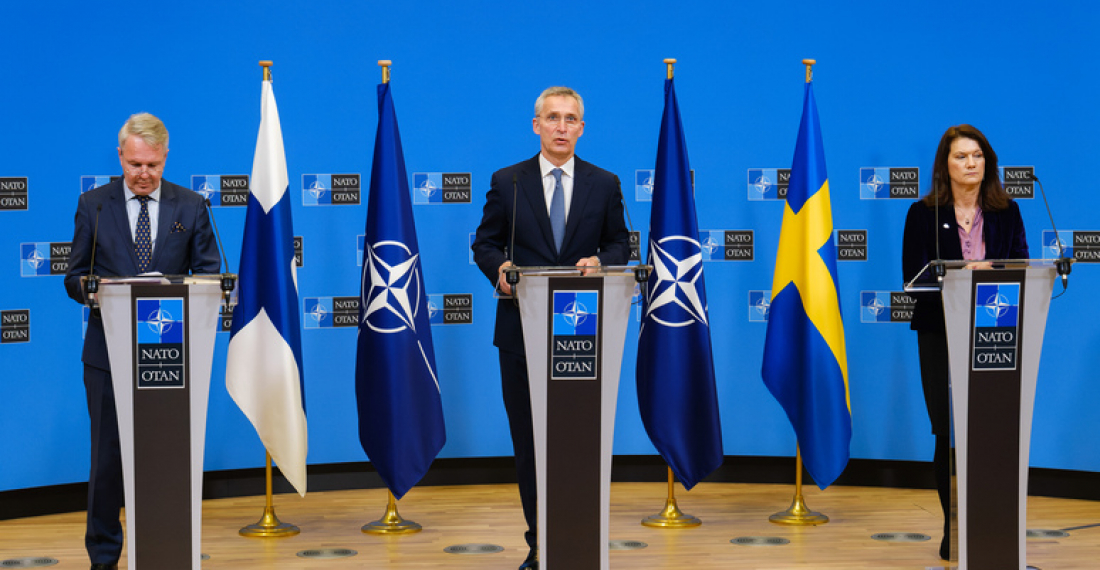As someone who believes most conflicts can and should be resolved peacefully I do not normally rejoice at the expansion of military alliances. Defence is of course the right of every country, and every government needs to make difficult decisions as to how best it can provide security for its country and its people. Joining a military alliance is one option, but depending on geography and circumstance, there may be others
For decades, Finland and Sweden weathered the dangers of the cold war as neutral states, sandwiched between the Soviet Union and its Warsaw Pact allies, and the United States and its European allies in NATO. It was a risky situation. Their professed neutrality was seen as a naivety by some, as a vulnerability by others. But they used their status for the common good. Finland and Sweden, together with other neutral and non-aligned countries such as Austria, Switzerland, Yugoslavia and Malta, helped to bring about the Helsinki Conference on Security and Co-operation in Europe, and in 1975 the signing of the Helsinki Final Act, a milestone document that reduced tension during the cold war, and provided a blue print for what followed
This week they broke with their historic position of neutrality, which in the case of Sweden had lasted for two centuries, and applied to join NATO.
This was the right decision, and their application should be accepted quickly and wholeheartedly by the NATO allies.
The Russian aggression against Ukraine, launched on 24 February, has exposed the danger that the policy pursued by Putin’s Russia poses for European and international peace and security. There have been plenty of signs in the last two decades that Putin’s Russia was a revisionist state that sought to change the international order as laid out in the Charter of the United Nations, the Helsinki Final Act and other landmark international agreements. Russia-s continued claim for a special sphere of influence in the so-called “near abroad”, the encouragement of secessionist elements in Georgia, Moldova and Ukraine, leading to the establishment of puppet protectorates, and finally the annexation of Crimea in 2014, were never isolated incidents, but part of a strategy to restore Russian hegemony over its neighbours, and Russia’s great power status.
Russia’s outright invasion of Ukraine on 24 February, and Putin rantings just ahead of that, in which he questioned the very existence of the Ukrainian state and nation, finally exposed the evil for what it was. Now the Russian people, as much as the Ukrainian people, are paying a huge price for this misguided policy and strategy of their leaders in the Kremlin.
After the collapse of the USSR in 1991 the west did not try to isolate Russia, as some claim, but rather sought to embrace it. Russia’s inclusion in the G8 was a major step which accorded Russia a place amongst the world’s most developed countries, all of who are functioning democracies. But this was not a forum Russia was ever comfortable in. Instead Russia sought a forum of two: one in which it sits equally with the world’s only superpower the United States. Not because of its economic strength, or even its military might – Ukraine soon exposed the limits of that – but simply because like the United States it has plenty of nuclear weapons that could annihilate the world.
Can this Russia be brought back to the negotiating table, and should not countries like Finland and Sweden have used their neutrality to try to achieve that? Of course negotiations with Russia will always be necessary, but only on the most essential issues. For now, and for the foreseeable future, Russia needs to be challenged and confronted. Its policies are a risk to its neighbours, a threat to European and international peace and, unless challenged they will return the world order to the rule of the jungle. As small countries neighbouring Russia, situated in the increasingly volatile Arctic region, and close to the Baltic states, considered a prime target for future Russian aggression, Finland and Sweden were left with no choice. Their decision to apply for NATO membership was the right one.
Most NATO countries have rushed to welcome the two Scandinavian countries as future allies. Finland and Sweden are mature democracies with well organised and well equipped armies which can quickly be integrated into the NATO structures. Their membership will contribute significantly to strengthening NATO’s northern flank, particularly as a new situation emerges in the Arctic where climate change is resulting in sea routes opening up with important military and economic consequences.
There have been some negative murmurings from some quarters, particularly from Turkey. Turkey has been resisting an armed insurgency in the South led by the PKK for decades. Turkish soldiers die every day. It is understandable that Turkey will want its future allies to empathise with its cause. In the end Turkey will also welcome Finland and Sweden in the NATO alliance, because this will ultimately also strengthen Turkey's own defence.
Europe’s security map continues to change in response to the Russian threat. Sweden and Finland’s NATO application will not be the last. Mr Putin has started a process the consequences of which he clearly had not forecast.







